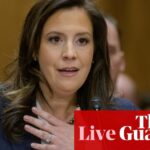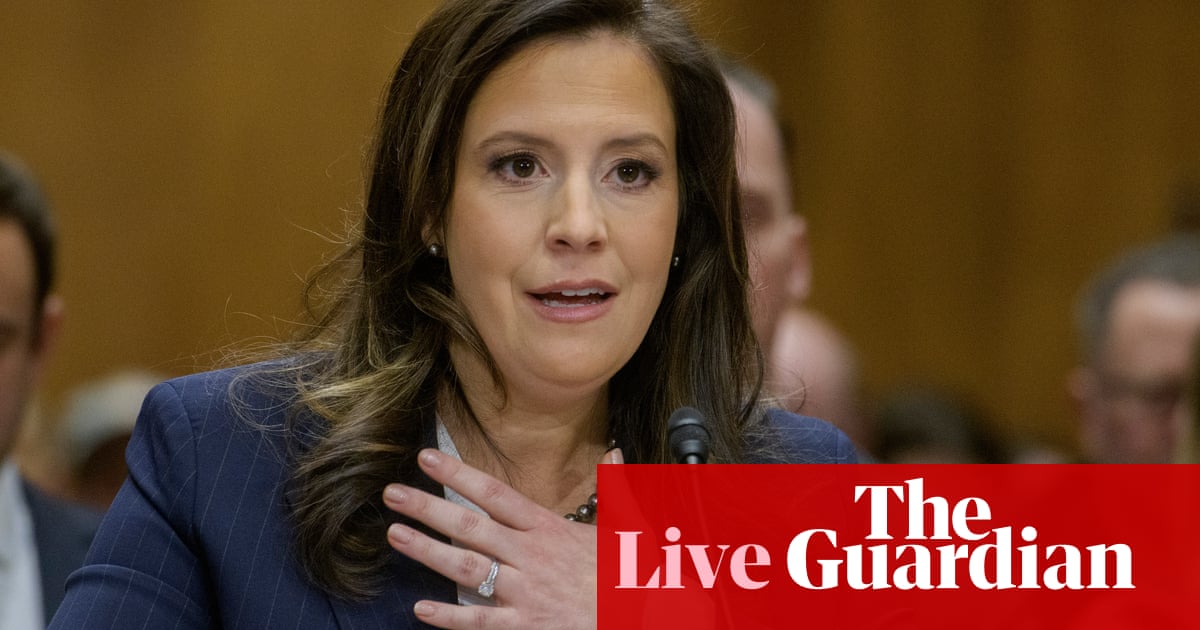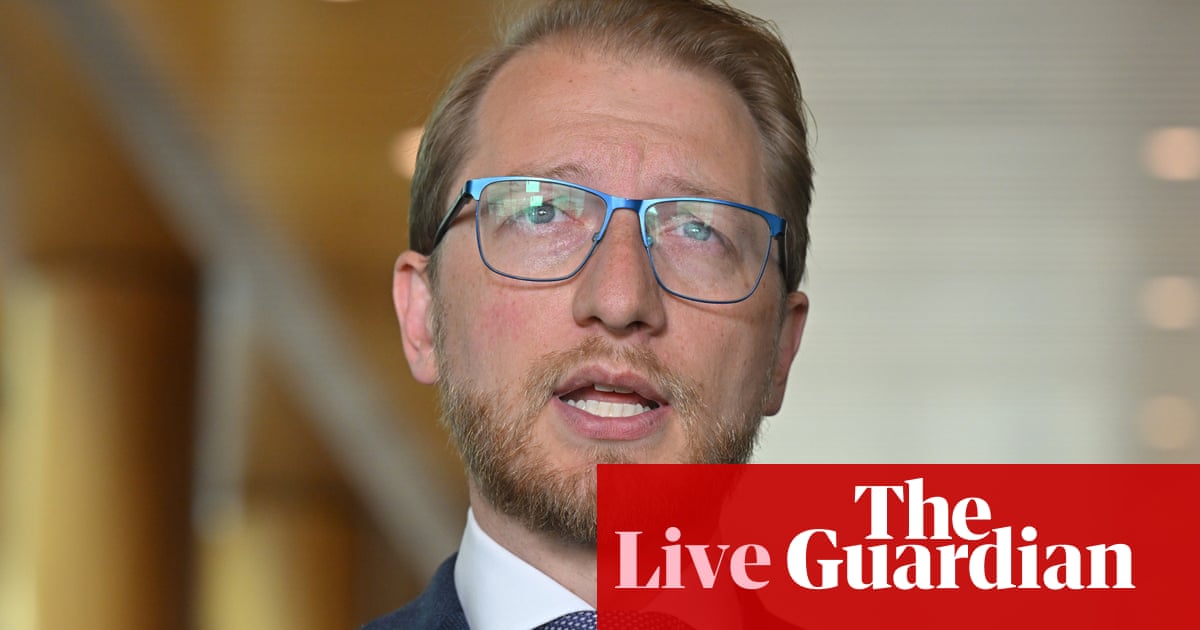Summary: all the key policy actions taken by Donald Trump on inauguration day
Long-term observers of president Donald Trump’s political tactics will remember his tendency to adopt what Steve Bannon calls “flooding the zone”, and yesterday’s inauguration day blitz of executive orders was in part intended to overwhelm the media and opponents so that it is harder to focus on any one issue.
Here is a list of all the key explainers and articles the Guardian has published over the last few hours documenting the areas the second Trump administration has already acted in:
Also worth noting among yesterday’s Trump-related events:
Key events
A World Health Organization spokesperson said on Tuesday that it regrets US president Donald Trump’s decision to withdraw from the global agency and hopes that it will change its mind.
“We hope that the US will reconsider, and we really hope that there will be constructive dialogue for the benefit of everyone, for Americans, but also for people around the world,” Reuters reports WHO spokesperson Tarik Jašarević told a Geneva press briefing.
Speaking at the World Economic Forum meeting in Davos, European Commission president Urusula von der Leyen has said she still supports the Paris Climate agreement.
Reuters quotes von der Leyen saying:
Europe will stay the course, and keep working with all nations that want to protect nature and stop global warming.
During her speech, in a clear reference to the change of direction in US policy signalled by Donald Trump, von der Leyen said the use of sanctions, export controls and tariffs was likely to increase, and that in dealing with the US, she said:
Our first priority will be to engage early, discuss common interests, and be ready to negotiate. We will be pragmatic, but we will always stand by our principles. To protect our interests and uphold our values – that is the European way
Trump yesterday ordered the US withdraw from the Paris Climate agreement, as he did during his first term, a decision reversed by Joe Biden just hours after he was sworn in as president in 2021.
Summary: all the key policy actions taken by Donald Trump on inauguration day
Long-term observers of president Donald Trump’s political tactics will remember his tendency to adopt what Steve Bannon calls “flooding the zone”, and yesterday’s inauguration day blitz of executive orders was in part intended to overwhelm the media and opponents so that it is harder to focus on any one issue.
Here is a list of all the key explainers and articles the Guardian has published over the last few hours documenting the areas the second Trump administration has already acted in:
Also worth noting among yesterday’s Trump-related events:
Over at CNN, Stephen Collinson has offered his regular analysis of US political events, writing of yesterday:
The new president set off simultaneous political alarms in multiple foreign capitals with off-the-cuff foreign policymaking, instantly turning the US away from the internationalism embraced by every president apart from him since the second world war.
In a freewheeling news conference back in the Oval Office, Trump demonstrated a capacity to drive his own message and move geopolitical chess pieces in public in a way that Biden lost when age caught up with him. The imagery was of a well-briefed new president eyeing big goals, confident that his first term gives him a heads-up on how to wield the levers of power and determined to make the most of a second chance.
But Trump also laced the pageantry of inauguration day with rally-style grievance politics and vast doses of untruths, twisted facts and an increasingly messianic sense of his own power, which was a foreboding omen for the rule of law.
Alexandra Villarreal
Alexandra Villarreal has this explainer on what Donald Trump’s executive order on US birthright citizenship seeks to achieve:
What does Trump’s executive order do?
The executive order signed on Monday tries to make it so that children born in the US, but without at least one parent who is a lawful permanent resident or US citizen, are no longer automatically extended US citizenship.
It also disallows federal agencies from issuing or recognizing documentation proving US citizenship for such children.
Notably, the executive order targets kids born to both unauthorized immigrants and people legally in the US on temporary visas.
Could Trump actually end birthright citizenship?
Maybe – although likely not, and almost definitely not through executive order.
The Citizenship Clause is part of the US constitution, the nation’s founding document. Generally, legal scholars strongly suggest that neither executive action nor legislation should be able to supersede the constitution’s guarantee of birthright citizenship for those born on US soil.
Forcing the supreme court to reinterpret the 14th amendment is likely part of the long game that the Trump administration is playing with its executive order.
Read more of Alexandra Villarreal’s explainer here: What is US birthright citizenship and what does Trump’s executive order do?
Writing for The Hill political website in the US, Niall Strange has highlighted president Joe Biden’s late issuing of pardons as one of their five key takeaways from yesterday’s inauguration day. He wrote:
Biden issued pre-emptive pardons to five members of his own family. The family pardons, in particular, seemed an inglorious way for the outgoing president to depart.
Prior to the Hunter Biden pardon, the elder Biden had repeatedly argued that Trump was the one who sought to bend the justice system to his personal benefit.
Now, on his way out the door, the 46th president has issued blanket pardons to his brother James, his sister Valerie and their respective spouses. He also pardoned his other brother, Francis.
Announcing the pardons, Biden contended that “my family has been subjected to unrelenting attacks and threats, motivated solely by a desire to hurt me – the worst kind of partisan politics.”
Still, the last-minute nature of the pardons was a bad look for a president who had presented himself as a defender of democratic and legal norms.
Pelosi: ‘shameful’ that Trump has made 6 January pardons a top priority
The Democratic party former House speaker Nancy Pelosi has described it as “shameful” and “an outrageous insult” that newly inaugurated president Donald Trump has made pardons for those involved in the 6 January Capitol riot a top priority.
In the statement, Pelosi said:
Tonight, the president announced pardons and commutations of sentences for those who violently attacked the Capitol and law enforcement officers on 6 January. The president’s actions are an outrageous insult to our justice system and the heroes who suffered physical scars and emotional trauma as they protected the Capitol, the Congress and the constitution.
It is shameful that the president has decided to make one of his top priorities the abandonment and betrayal of police officers who put their lives on the line to stop an attempt to subvert the peaceful transfer of power. Despite the president’s decision, we must always remember the extraordinary courage and valor of the law enforcement heroes who stood in the breach and ensured that democracy survived on that dark day.”
Trump on Monday issued “full, complete and unconditional” presidential pardons for about 1,500 people who were involved in the January 6 attack on Congress, including some convicted of violent acts. Among those whose sentences were commuted was Stewart Rhodes, the founder of the far-right Oath Keepers militia.
Sam Jones is the Guardian’s Madrid correspondent
Spain’s labour minister and deputy prime minister, Yolanda Díaz, has announced that she has stopped using X following Elon Musk’s apparent Nazi salute at Donald Trump’s inauguration on Monday.
In a post on Bluesky, Díaz wrote: “For months now, Elon Musk has been using X for political ends. It has stopped being a tool for communication, or a social network, and has become a propaganda mechanism that uses its algorithm to favour some ideas over others and, by doing so, affect public opinion. Last night, the entire planet could see Elon Musk emulating the Nazi salute in the context of Donald Trump’s inauguration. It was a very stark image that has led me to make a decision I’ve been considering for months … From now on, I will not be using my [X] account.”
Díaz’s announcement came hours after Spain’s socialist prime minister, Pedro Sánchez, urged Europe to resist a big tech “class” trying to influence western governments and public debate through its “absolute power over social media”.
On Monday, Sánchez told a conference on artificial intelligence: “Faced with this we have to fight back and we must put forward alternatives … Europe must stand up to this threat and defend democracy.”
Elsewhere in Spain, the media have noted that Trump yesterday incorrectly claimed that Spain is among the BRICS nations (chiefly Brazil, Russia, India, China, South Africa), and the country could face 100% US tariffs on its products.

David Smith
My colleague David Smith in Washington had this sketch of yesterday’s events:
When the obituary of planet Earth is written, there may be a prominent slot for what took place in a basketball and ice hockey arena in downtown Washington on 20 January, 2025.
It was here that, with a wry head shake and gleeful twirl of the pen, Donald Trump again withdrew the US from the Paris climate agreement, to the joy and jubilation of 20,000 spectators apparently indifferent to fate of the pale blue dot they live on.
“We’re going to save over a trillion dollars by withdrawing from that treaty,” gushed an aide at Trump’s prompting, implying that watching the world burn is a small price to pay.
This was the moment it really hit home. Trump is back. The human wrecking ball who left a trail of chaos and division in his first four years has returned with a vengeance. America voted for this. People will get hurt.
Monday’s first batch of executive orders, contained in black folders, was also a reminder of Trump’s insatiable appetite for spectacle. His swearing in and inauguration parade had been brought indoors because of extreme cold weather. Naturally he saw an opportunity to turn it into a reality TV show.
Read more of David Smith’s sketch here: Trump the wrecking ball brings chaos to order, executing a parade of grievances
There has been diplomatic reaction from China to president Donald Trump’s opening blitz of policy announcements on inauguration day.
During the regular daily foreign ministry briefing, spokesperson Guo Jiakun said China is concerned at Trump’s announcement the US is again withdrawing from the Paris climate deal. Reuters quotes the official saying China is actively responding to climate change and will jointly promote global green and low-carbon transition.
The spokesperson also said that the World Health Organization should only be strengthened, not weakened. He said China would continue to support it in fulfilling its responsibilities. Trump has ordered the US to pull out of the UN health agency.
If you didn’t watch any of Donald Trump’s inauguration yesterday, or just want a reminder, our video team have put together this report highlighting the key moments.

Archie Bland
For the Guardian’s First Edition newsletter this morning, my colleague Archie Bland has this to say about Donald Trump’s inauguration speech yesterday:
The closest to an “American carnage” style soundbite this time around was the much more anodyne promise that 20 January would be remembered as “liberation day”. And Trump read out some poor speechwriter’s attempt at soaring rhetoric in the same tone he might use to repeat a particularly complex delivery order.
Still, if you listened to the detail, the same nihilistic picture, of a nation in a state of catastrophic decay, emerged among the attempts at nationalist fervour. As Margaret Sullivan notes in this panel of reaction from Guardian US columnists:
Donald Trump spoke of love, of God and of a new golden age for the United States of America. But just beneath that gilded surface, his inaugural speech sent a different message entirely.
That message: America has been invaded by “millions of criminal aliens” who would be sent home, while a state of emergency would be declared to allow the deployment of the military at the southern border with Mexico. The government would recognise “only two genders, male and female”. Support for electric cars would be reversed, and a “national energy emergency” declared to allow the suspension of environmental regulations and more drilling for oil and natural gas.
Read more from Archie Bland here: Tuesday briefing – What inauguration day told us about Trump’s plan for power
Russia’s deputy foreign minister Sergei Ryabkov has reacted to Donald Trump’s words over the future of the Panama Canal.
State-owned Russian news agency reports, in response to a question, he said:
We expect that during the expected discussions between the leadership of Panama and US president Donald Trump on issues of control over the Panama Canal, which certainly falls within the sphere of their bilateral relations, the parties will respect the current international legal regime of this key waterway.
The canal was built by the US in the early 1900s after an earlier failed attempt by France, and a treaty signed by the late president Jimmy Carter in 1977 transferred the canal to Panama in 1999 and allowed any nation to use it.
The US launched a military invasion of Panama in 1989 that left as many as 1,000 people dead as it overthrew president Manuel Noriega.










